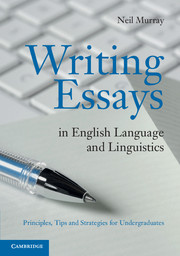 Writing Essays in English Language and Linguistics
Writing Essays in English Language and Linguistics Book contents
- Frontmatter
- Contents
- Acknowledgements
- Introduction
- A guide to the book's icons: what do they mean?
- Part 1 The basics
- Part 2 Getting down to writing
- Chapter 3 Analysing and answering the question
- Chapter 4 The writing process
- Chapter 5 Writing an introduction
- Chapter 6 Writing the body of your essay
- Chapter 7 Writing summaries and conclusions
- Chapter 8 Referencing and quotations
- Chapter 9 Stylistic issues
- Chapter 10 Writing up small-scale research projects or dissertations
- Frequently asked questions
- Linguistics glossary
- Task key
- References
- Index
Chapter 3 - Analysing and answering the question
from Part 2 - Getting down to writing
Published online by Cambridge University Press: 05 June 2012
- Frontmatter
- Contents
- Acknowledgements
- Introduction
- A guide to the book's icons: what do they mean?
- Part 1 The basics
- Part 2 Getting down to writing
- Chapter 3 Analysing and answering the question
- Chapter 4 The writing process
- Chapter 5 Writing an introduction
- Chapter 6 Writing the body of your essay
- Chapter 7 Writing summaries and conclusions
- Chapter 8 Referencing and quotations
- Chapter 9 Stylistic issues
- Chapter 10 Writing up small-scale research projects or dissertations
- Frequently asked questions
- Linguistics glossary
- Task key
- References
- Index
Summary
‘I'm not always sure exactly what the question means . . . you know, what they want and what I should be doing.’
What do assignment questions mean?
There's no point in producing an assignment that's well organised, written in beautifully crafted sentences and demonstrates considerable research and understanding of concepts if what you write ultimately fails to answer the question set. Even with the best will in the world, your lecturer won't be able to pass it. In order to avoid this situation there are a number of simple precautions you can take. First and foremost, before you answer any question, take a little time to think about what the question really means and what it's asking you to do. All too often, students eager to begin an assignment and ‘get it out of the way’ take only one pass at the question; their first reading of it is what they go with and they tend to miss important words and nuances as a result. Understanding the key elements of assignment questions can help you to produce essays that are relevant and do not miss the point by giving you an analytical tool with which to drill down into the question and ensure your interpretation of it is correct.
Information
- Type
- Chapter
- Information
- Writing Essays in English Language and LinguisticsPrinciples, Tips and Strategies for Undergraduates, pp. 45 - 71Publisher: Cambridge University PressPrint publication year: 2012